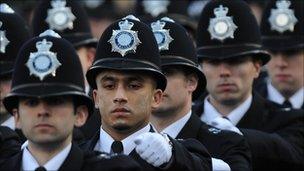Budget cuts 'threaten 60,000 police jobs'
- Published

The study uses projections from the Institute for Fiscal Studies
Budget cuts in the police service in England and Wales could lead to 60,000 police officer and civilian posts being axed by 2015, a study suggests.
That "worst-case" scenario represents about 25% of the total, with civilian posts probably hardest hit, says the report for Police Review magazine.
Policing Minister Nick Herbert said the study was "all based on assumptions".
"What we are saying is we will do everything we can to help the police protect the front line," he said.
Mr Herbert added that while police forces would have to make savings, the exact figures would not be known until the end of the year, following the conclusion of the government's Comprehensive Spending Review.
He said there were ways in which police forces could save money, such as combining their procurement work and allowing police officers to cut down on their paperwork.
'Operational change'
The study, which was conducted by former Gloucestershire Chief Constable Tim Brain, adds that if adjustments are made for inflation and growth, cuts might fall to between 11,500 and 17,000 jobs.
His report is the first detailed analysis of how cuts in Βι¶ΉΤΌΕΔ Office grants and local authority funding could affect the police.
Using public spending projections from the Institute for Fiscal Studies, Mr Brain estimates that in the worst-case scenario, 60,000 full-time police officer, civilian staff and community support officer posts would go by 2015.
Mr Brain, who used to speak on police finance issues for the Association of Chief Police Officers (Acpo), said police forces that relied more on government grants than council funding would be worst affected.
He said: "Probably forces would try and keep the number of police officers up, but that means you've got to lose more civilian staff - a lot more - because by and large the civilian staff cost less than police officers.
"Of course, it's important to emphasis that they don't do the kind of work that police officers do. They are contracted to do specific jobs that are largely but not exclusively non-operational."
Policing Minister Nick Herbert: "We can't give a guarantee about numbers"
However, he added that large-scale cuts would soon be noticed by the public.
"When I joined the police service back in 1978, it was largely a response-orientated service. We could do some investigation, we could do some proactive patrol, but we largely responded," he said.
"In the last few years we've got used to seeing neighbourhood policing teams. We've got used to seeing officers in our localities, doing the kind of things that are important to local people. Now that's the bit of the service that has expanded most recently.
"If we start to lose that, people would notice it very quickly; it would be back to largely a response-orientated police service, very different from the one that we've begun to enjoy and experience in recent years."
'Key priority'
Βι¶ΉΤΌΕΔ Secretary Theresa May told the Commons home affairs committee that the projected cuts in police numbers were "entirely speculative".
"I don't think it is helpful to speculate or comment on that speculation," she said.
"I believe that there are costs that can be driven out of police forces. I believe there are savings that can be made that will not affect front-line services."
Last month, she said police availability for front-line duties should increase even as budgets contracted, but Mr Brain said it was "difficult" to see how front-line policing could be protected.
A Βι¶ΉΤΌΕΔ Office spokesman said: "The government's priority is to cut the budget deficit and the police will have to bear a fair share of the burden. The level of future police funding will be set as part of the Spending Review. Front-line services will always be what matter most to the public. Our aim is to cut bureaucracy so that police can spend more time on the beat."
Meanwhile, a senior Labour MP has warned the government that if it goes ahead with big cuts in spending on the police, there would be "conflict" with officers.
Keith Vaz, who chairs the Commons home affairs committee, told MPs ministers should not assume officers would accept the job losses that must follow.
"If the comprehensive spending review does cut the police budget by 25%, and Acpo has said this means 20,000 less police officers, then we will see a conflict between the government and police force, because I do not believe they will remain silent," he said.
He also said the government should have ringfenced the Βι¶ΉΤΌΕΔ Office budget.
"I understand we have to preserve the budgets of the NHS and education, but I think as far as law and order is concerned, the coalition government will regret the fact that it did not work harder to keep the budget of the Βι¶ΉΤΌΕΔ Office intact.
"Why? Because this is a key priority for every single member of this House through the prism of the local constituency. And we know that the demand from local people is more doctors and nurses, better schools and more police officers."
- Published15 July 2010
- Published2 July 2010
- Published29 June 2010
- Published9 June 2010